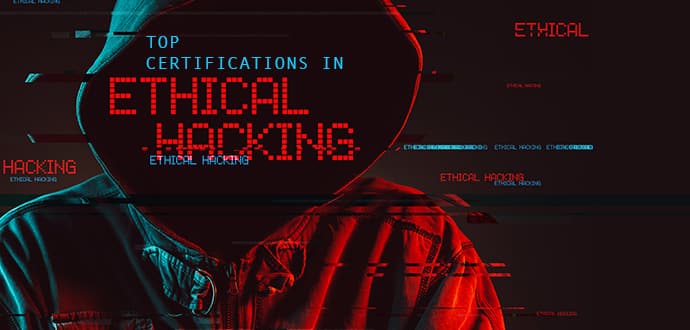
An ethical hacker (also called a white hat hacker) is a cybersecurity expert that supports organizations or governments by searching for vulnerabilities and by performing penetration testing to identify security threats. Their intention is ethical and is generally considered to be a defense against malicious hackers or black hat hackers while the information that is gathered is used to bolster the system security and to prevent malicious attacks.
Some of the ethical rules that guide ethical hackers’ intentions include:
Express or written permission to probe a system or network to find potential security threats or risks.
High regard and respect for organization or individual privacy
All vulnerabilities and exploits are revealed to the security experts in the organization that is being tested
Once the job is complete, no loopholes that can be exploited are left behind
How Ethical Hacking has become a popular career choice
Cyber criminals and black hat hackers have always been sophisticated and ingenious in finding ways to breach security systems. Their incessant attacks that increasingly happen minute by minute, target organizations for all sorts of reasons including financial gain or to damage the organization’s reputation. That said, most attacks are often successful for the simple reason that security is easy to breach.
Almost all organizations these days have an online presence, and these organizations want to protect themselves from the devastating and crippling effects of malicious hacking. Therefore, organizations are forced, ever more, to invest in technology, cyber security experts, and training. In fact, it is estimated that by 2021, the global spend on cybersecurity will reach $1 trillion. Such amounts may seem astounding, but the fact is that they pale in comparison to estimated losses of $6 trillion that will be incurred annually by 2021 as a result of malicious hacking.
Without the ethical hacker who can get into the mind of a black hat hacker, bugs, security loopholes, zero-day threats, and other exploits will go unnoticed and therefore expose everyone to tremendous losses. As such, most companies now have bounty programs in addition to the standard security protocols designed to protect their systems. These bounties can pay anywhere between $500 to more than $100,000.
If you want to tap into such bounties or if you want to build a long-term fulfilling career in cyber security, then you need to have the skills to back up your intention or ambition. Below are some of the certifications that you could benefit from.
What certifications can benefit your career in the cyber security domain?
Certified Ethical Hacker
CEH is offered by EC-Council. The goal of the course is to ensure that the candidate can think like the hacker to beat the hacker.
Demand for skilled professionals
This is probably the most important certificate for an ethical hacker, and it is therefore in very high demand among employers.
Prerequisites
Candidates must either have;
At least two years of information security (IS) experience. OR,
Take a formal training course through the EC-Council costing $850.
Career benefits
Most certifications teach candidates how to configure systems securely. CEH additionally teaches candidates about the tools hackers use and more importantly how these tools are used to attack system vulnerabilities.
Salary across the globe
The average salary is approximately $70,000 per year.
How to achieve certification
Certification requires candidates to:
Apply for exam eligibility
Pay an exam fee of $950 And
Sit a 4-hour, 125 multiple-choice question exam.

Certified Information Systems Security Professional
The certification exam is offered by (ISC)2. The goal of the course is to ensure that the candidate can engineer, design, implement and run an IS program.
Demand for skilled professionals
Demand for professionals that can manage large and small IS systems is high. The certification is also essential for those that want to grow into positions of authority and responsibility in the cybersecurity industry.
Prerequisites
Candidates must either have at least 5-years work experience in at least two of six (ISC)2 CISSP Common Body of Knowledge domains.
Career benefits
The certificate is approved for IS professionals by the highest level of security in several large organizations and governments including the U.S. Department of Defense.
Salary across the globe
The average salary is approximately $50,000 and 118,000 per year.
How to achieve certification
Certification requires candidates to:
Subscribe to the (ISC)2 Code of Ethics
Register for the exam at the cost of $600
Take a 6-hour 250-question exam and achieving a scaled score of over 700 out of 1000 marks.
Receive endorsement from an (ISC)2 certified professional.

Certified Information Systems Auditor
The certification exam is offered by ISACA.The goal of the course is to ensure that the candidate demonstrates knowledge of Information Security (IS) acquisition, development, implementation, and information asset protection.
Demand for skilled professionals
The certificate is beneficial for IS auditing professionals especially those that want to grow their career to the next level in an enterprise-level organization.
Prerequisites
Candidates must either have;
At least 5-years of professional experience in IS security work including audit, and control
Up to 3-years of this experience can be substituted with educational or work experience in some instances
Career benefits
Successful candidates can demonstrate knowledge in key IS areas including IS acquisition, development, implementation, and information asset protection. These areas of expertise are crucial considerations for employers especially with regards to protecting employer assets.
Salary across the globe
The average salary is between $50,000-$120,000 per year
How to achieve certification
Certification requires candidates to:
Register for the exam at the cost of $575 for ISACA members or $760 for non-ISACA members
Take a 4-hour 150-question exam and achieving a scaled score of over 450 out of 800 marks.
Candidates must observe ISACA’s Standards and Code of Professional Ethics (including adhering to their Continuing Professional Education program)
Apply for certification after passing the exam

Certified Information Security Manager
The certification exam is offered by ISACA. The goal of the course is to ensure that the candidate can demonstrate knowledge of best practices in international security. The certification has a focus on management.
Demand for skilled professionals
CISM professionals oversee and assess enterprise-level information systems. As such, demand for this certification is global and quite high.
Prerequisites
Candidates must either have;
At least 5-years of information security management experience
Up to 2-years of this experience can be substituted with educational or work experience in some instances.
Alternatively, up to 2-years of experience can be substituted with CISSP and CISA certifications
Career benefits
The certification is valuable for IS professionals seeking a managerial capacity in IS.
Salary across the globe
The average salary is between $50,000-$162,000 per year.
How to achieve certification
Certification requires candidates to:
Register for the exam at the cost of $575 for ISACA members or $756 for non-ISACA members
Take a 4-hour 150-question exam and achieving a scaled score of over 450 out of 800 marks.
Candidates must observe ISACA’s Standards and Code of Professional Ethics (including adhering to their Continuing Professional Education program
Certified Cloud Security Professional
The certification exam is offered by a collaboration of both the (ISC)² and Cloud Security Alliance. The goal of the course is to ensure that the candidate can address security challenges that enterprises face with cloud computing.
Demand for skilled professionals
Demand scales along with the increased use of cloud computing at the enterprise level.
Prerequisites
Candidates must either have;
At least 5-years cumulative paid work experience in IT.
3 of these years should be in information security and at least 1 year in any of the six (ISC)2 CCSP Common Body of Knowledge domains including;
Operations
Legal and Compliance
Cloud Applications Security
Cloud Data Security
Architectural Concepts and Design Requirements
Cloud Platform and Infrastructure Security
Career benefits
Successful candidates will appreciate the following benefits
High recognition from two respected non-profit organizations, CSA and (ISC)²
The certification keeps professionals abreast of currently emerging technologies as well as new threats and strategies
The accreditation is vendor-neutral and can, therefore, be used across different cloud platforms
Opportunity for employment with a good salary is high
Salary across the globe
The average salary is between $82,000 and $180,000 per year
How to achieve certification
Certification requires candidates to:
Sit for the exams at an accredited Pearson Professional Center.
Sit for a 4-hour, 125-question multiple choice exam that covers six domains as prescribed by the (ISC)2 CISSP.
Candidates must achieve a score of at least 70 out of 100 points to be certified

![How To Read Deleted WhatsApp Messages? [Working 2019]](https://blogger.googleusercontent.com/img/b/R29vZ2xl/AVvXsEjekX46Bu79o0XT2nwhL6Uj7SDzew-iP1dqXflRQfAwyVLJE7QWkN8LIRUADV4P8Y5fTvj46B074-hlZ9XMdsbxz9HYYG9vgqgFqFSZf62dFHf-_34bhwFHfEy8iUkJIiEYdNyw1iur7eEO/w680/How-To-Read-Deleted-WahtsApp-Messages-696x414.jpg)


1 Comments
Having knowledge about ethical hacking has become an indispensable skill in today's world due to its high demand. In light of the prevalence of cybercrime, it is essential for everyone to have a basic understanding of cybersecurity to guarantee their safety and protection online. This article highlights the importance of keeping up with the latest trends in ethical hacking and the necessary knowledge in this field.
ReplyDelete